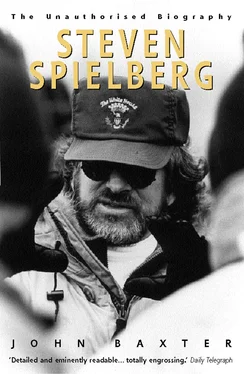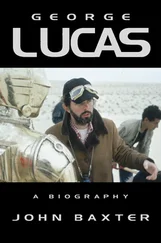The Unauthorised Biography
STEVEN SPIELBERG
JOHN BAXTER

Further reviews for Steven Spielberg :
‘Diligent, perceptive and with every available anecdote’
SIMON HATTENSTONE, Guardian
‘riveting… retains a healthy objectivity throughout his enthralling account’
PENELOPE DENING, Irish Times
‘… a film-lover’s book, a review of a remarkable era, an exhaustive filmography – a movie about the evolution of Hollywood, with Spielberg as the central character’
JEREMY LESTER, Jewish Chronicle
‘Baxter may have a blockbuster on his hands.’
RICHARD E. GRANT, Sunday Times
‘highly entertaining, packed with interesting information. If you want to know how a Spielberg film was made, what shenanigans went on during the making, or who fell out with whom, it is all here.’
WILLIAM RUSSELL, The Herald (Glasgow)
‘Its usefulness lies in Baxter’s shrewd assessment of Spielberg’s relationship with the wider context of the entertainment industry in general and Hollywood power-politics… the account of Spielberg’s unsettled early years… is illuminating in terms of his later preoccupations.’
HUGO DAVENPORT, Sunday Telegraph
‘Baxter is quietly professional… and makes good use of the copious interviews Spielberg has given throughout his career.’
ANTHONY QUINN, The Observer
‘A very valuable book… the thing that most impresses in his book is the calm, careful and nearly gentle way in which it builds up our disquiet that the movie kingdom and our society as a whole should be so ordered that Steven Spielberg is its Gatsby, its Kane, and such a shining young example… it is Baxter’s most intriguing point that Spielberg not only caters to youthfulness, but extends and preserves it… What is so clever, I think, is Baxter’s sense of a man too narrowly focused to amount to a villain… Baxter’s success is beyond question.’
DAVID THOMSON, Independent on Sunday
‘An impeccably professional film-biographer (he’s already done Buñuel, Fellini, Ford and is now working on Kubrick), Baxter leaves no document unrifled, no fact unchecked, no anecdote untold.’
Sight and Sound
‘… a full, frank and readable account of a man who the public regards as one of the greatest enchanters in the history of film.’
STUART GILLES, Manchester Evening News
Cover
Title Page
Praise
1 The Man who Fell to Earth
2 The Boy who Swallowed a Transistor
3 Amblin’ Towards Bethlehem
4 Universal Soldier
5 Duel
6 The Sugarland Express
7 Jaws
8 Close Encounters of the Third Kind
9 1941
10 Raiders of the Lost Ark
11 Poltergeist and E.T: The Extraterrestrial
12 The Twilight Zone: The Movie
13 Indiana Jones and the Temple of Doom
14 The Color Purple
15 Empire of the Sun
16 Indiana Jones and the Last Crusade
17 Always and Hook
18 Jurassic Park and Schindler’s List
19 The Dream Team
Notes
Select Bibliography
Index
Acknowledgements
Keep Reading
About the Author
Also by the Author
Pre-Credit Sequence The Sandcastle
Filmography
Copyright
About the Publisher
1 The Man Who Fell to Earth
Yesterday, upon the stair,
I met a man who wasn’t there.
He wasn’t there again today.
I wish that man would go away.
Traditional rhyme
THE FORCE of American popular art lies in its directness, its simplicity, its economy of means and of scale. Analysis may uncover cultural and autobiographical references, sophistications of technique, even profundity of intellect, but the first appeal of a George Gershwin song, a Walt Disney cartoon, a Norman Rockwell painting is, and must be, commonplace delight.
Steven Spielberg embodies this tradition. His films, even the sombre Schindler’s List , are machines for delighting us. Almost always they succeed in doing so. It’s not hard to see why. He traffics in what authors of science fiction, his preferred form, call ‘a sense of wonder’, a heightened apprehension of physical possibilities. It has been said that the universe is not only stranger than we know but stranger than we can know. Spielberg dispels this idea. His vision, like that of the best science fiction writers, is of a welcoming, explicable place.
Writing about Ray Bradbury, whose books like The Martian Chronicles and Something Wicked this Way Comes share Spielberg’s simplicity of vision and sureness of technique, the critic Damon Knight, in a passage that could well refer to Spielberg, remarked:
To Bradbury, as to most people, radar and rocket ships and atomic power are big, frightening, meaningless names; a fact which, no doubt, has something to do with his popular success, but which does not touch the root of the matter. Bradbury’s strength lies in the fact that he writes about the things that are really important to us: not the things we pretend we are interested in – science, marriage, sports, politics, crime – but the fundamental pre-rational fears and longings and desires; the rage at being born; the will to be loved; the longing to communicate; the hatred of parents and siblings; the fear of things that are not self…
People who talk about Bradbury’s imagination miss the point. His imagination is mediocre; he borrows nearly all his backgrounds and props, and distorts them badly; wherever he is required to invent anything – a planet, a Martian, a machine – the image is flat and unconvincing. Bradbury’s Mars, where it is not as bare as a Chinese stage setting, is a mass of inconsistencies; his spaceships are a joke; his people have no faces. The vivid images in his work are not imagined; they are remembered .
In 1987, cartoonist Jules Feiffer drew a panel for the magazine Village Voice . A writing professor lauds a student for his ‘Joycean gift of language coupled with a Hemingwayesque spareness’. He goes on to compare him with Fitzgerald, Bellow, Updike, Styron, Mailer, then asks him what he’s working on. ‘A screenplay for Spielberg,’ the boy says airily. The professor is suddenly a beaming enthusiast. ‘Do you know him?’ he demands. ‘What’s he really like?’
The public urge to know what Spielberg is really like has never abated. His personality and appearance are so unremarkable, his public statements so bland, that everyone feels there must be a secret Spielberg hidden under the ramshackle exterior.
If you were to ask Spielberg what he is really like, he would probably reply that he is just like his audience. He is like everyone. But the image of Just Plain Steve is simply one aspect of his public persona. Examine that persona, and it fragments into a jigsaw puzzle where real memories slot into fabricated ones, and where childhood enthusiasms jostle for space with the structures of corporate power.
Spielberg’s indifferent communication skills don’t help to explain him to his public. His voice has never quite lost the self-absorbed gabble and stammer of the teenager drunk on ideas. ‘He has all the virtues – and defects – of a sixteen-year-old,’ one colleague remarks. Over the years he’s learned to smile and to pause occasionally for others to speak, but the interpersonal still daunts him. He communicates best from behind a protective grille of technology. On that level, he radiates competence. Everyone notices it. The novelist Martin Amis almost mistook him for the man who’d come to fix the Coke machine. Someone else described his image as ‘chemistry-student-next-door’. Both Amis and actor Tom Hanks compared him to the high school audio-visual assistant who alone understood 16mm projectors. (Spielberg worked his way through three years of college, in part by projecting classroom films.)
Читать дальше













